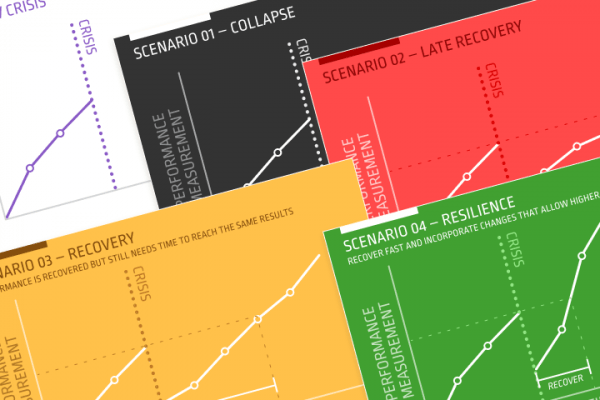Episode transcript The transcript is generated automatically by Podscribe, Sonix, Otter and other electronic transcription services.
Ricardo (4s): Hello, everyone in these really tough times. I want to talk to you about the concept of Resilience. So what are Resilience and I don't want to talk about just Resilience in infrastructure in the way we build things. No, but, we are talking about human and organizational resilience. Resilience is basically the capacity that an organization or a person or a group has to recover quickly in a trap. So the best way to explain how organizations and people behave when they face a disruption, like for example, the crisis we are facing right now with COVID-19.
Ricardo (44s): So imagine please with me a line and this line measures performance over time. So every normal company aims to grow results to improve performance over time. So it can be translated into profit impact revenue impact in the society. Even if you are not for profit, you want to improve your performance over time. So imagine this line that grows over time suddenly at a disruption happens. This disruption can be the example we are living right now with COVID-19, but it can be a natural disaster or a massive challenge in the economy that's just breaking that down.
Ricardo (1m 29s): Normal progress line that just stops that growth immediately. So that is when you have a crisis and basically, you have four possibilities of moving forward. The first one and the saddest one, the very sad is when you not only do not recover, but that triggers a collapse. And then suddenly you're not only going to an ascending course, but you go to a descending course and then you never recover your performance and you start losing even more performance.
Ricardo (2m 9s): Until you collapse and your company or your business goes just disappear over time. the second one is that you recover, but you never recover up to a point where you were. So another growing line, but with a much smaller inclination, you move and you will improve performance. But if you were improving performance at the rate of 30%, for example, you now improve at the rate of 5%. So you recover, but you suffer a dramatic impact on that recovery., The third one is when you hit and you recover at the same rate, but you lost that gap.
Ricardo (2m 52s): So your performance was 10. You reduce our performance to three, and then you start from three going again so that you lose maybe a couple of years to get to the same stage where you were before the crisis. But what is Resilience? Resilience is when you are able to recover, not at a rate of 30%, but at the rate of 45%, for example, and then you not only recover what you miss, but you can create a new niche as a new set of possibilities that make you even more strong. What I'm talking about, a resilient person and a resilient manager, a resilient leader is someone that bands, but do not break, is someone that can receive massive impacts of the crisis and can recover quickly.
Ricardo (3m 43s): You know, you get into the floor, you stand up quickly and not the ones that you get on the floor and you are not able to stand up. And this is to be resilient. So my question to you and why I'm recording this podcast at this time is, is that how resilient I am? How resilient is my project? It doesn't matter what methodology you are using. How resilient is my organization? Is my organization resilient to receive an impact in not only survive, but being able to innovate and look for different niches and grow and see this as an opportunity? So there is exactly what I want you to think.
Ricardo (4m 24s): It's the use of creativity they use of this kind of improvement to manage and make you able to not only recover but to become more strong. So take a look and think about that. I prepared a quick infographic about that. That will help you to see these different paths. And this is exactly what I want to share with you because many changes that we are facing now during this crisis, are not only changes is to solve a problem, but they will become a massive trend in this society, in the future virtual work online. So I said yesterday in a webinar that many people start buying groceries for the first time online and maybe this will change the behavior of people in how they buy groceries.
Ricardo (5m 12s): So this is just an example. So resilient in this capacity. It's like if I want to teach you in our infrastructure way, is that when you have a collapse of a house because of an earthquake, then you built a house that is strong enough, not only to resist that earthquake if it happens again but one that is even stronger and this is where Resilience comes in. So think about that, how I can implement Resilience in the work I do in the company. I work in the way I do my operations. So I hope you'll find this Podcast useful to you and see you next week in another five minutes. Podcast.

